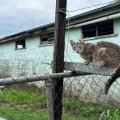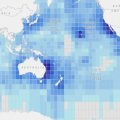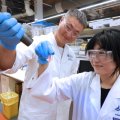The University of Queensland is playing a part in a clinical trial of the only known effective treatment for humans exposed to Hendra virus.
A joint grant of $1.2 million from the Queensland and NSW governments will fund a trial of a human monoclonal antibody produced at UQ’s Australian Institute for Bioengineering and Nanotechnology (AIBN) capable of neutralising Hendra virus.
Queensland Health Minister Lawrence Springborg, Queensland Minister for Agriculture Dr John McVeigh and NSW Minister for Primary Industries Katrina Hodgkinson announced the funding at UQ yesterday (31 October).
Humans can contract Hendra virus from horses infected through contact with flying foxes.
Four Queenslanders have died from the virus.
The antibody for the trial was developed through a long-standing association between Australian researchers and the US laboratories of Professor Christopher Broder at the Uniformed Services University of the Health Sciences and Dr Dimiter Dimitrov of the National Cancer Institute, National Institute of Health.
Queensland Health gained access to the cell line producing the antibody and provided it to AIBN.
Researchers at AIBN have provided the antibody to Dr Geoffrey Playford at Princess Alexandra Hospital for use on compassionate grounds to people believed to have been exposed to Hendra virus.
AIBN Director Professor Peter Gray said the antibody was a biologic medicine manufactured at the institute’s National Biologics Facility using a production process developed at AIBN.
“Biologics are medicines based on natural proteins made using recombinant DNA technology with the potential to target medical conditions for which there are no other treatments,” Professor Gray said.
The Phase I clinical trial is planned for early 2014, pending ethics approval.
It is believed the treatment will also be effective against the potentally fatal Nipah virus, found in humans in areas including Bangladesh and India.
Mr Springborg said Hendra knew no borders.
“This world-first trial will test the monoclonal antibody in a small group of people for the first time to evaluate its safety, determine a safe dosage range and identify any side effects,” he said.
“This is a collaboration between groups in Queensland, NSW and the US to develop a new medicine that could save lives in the event of a Hendra virus incident in Australia.
NSW Minister for Primary Industries Ms Hodgkinson said the research was a significant step forward in combating a deadly virus.
“This work is globally significant and, along with advancements in horse vaccine development, is critical in our future control strategies,” she said.
Media: Erik de Wit (0427 281 466, 3346 3962 or e.dewit@uq.edu.au)
.jpg)










